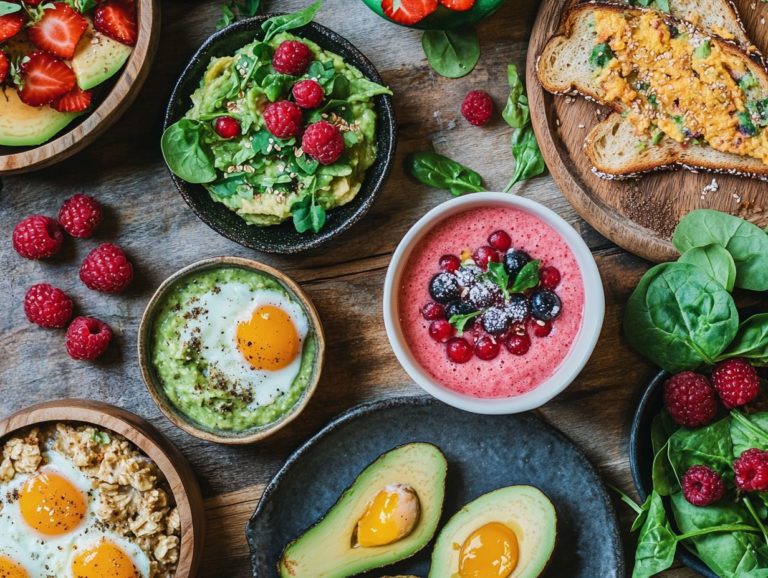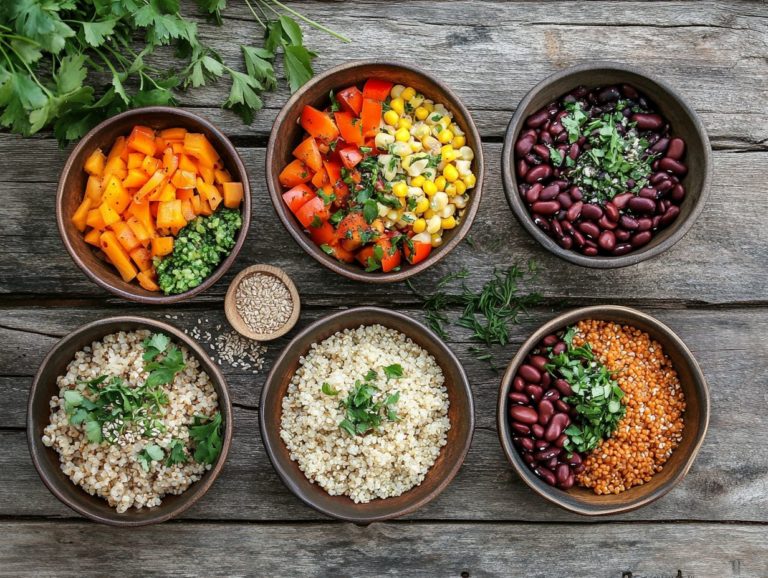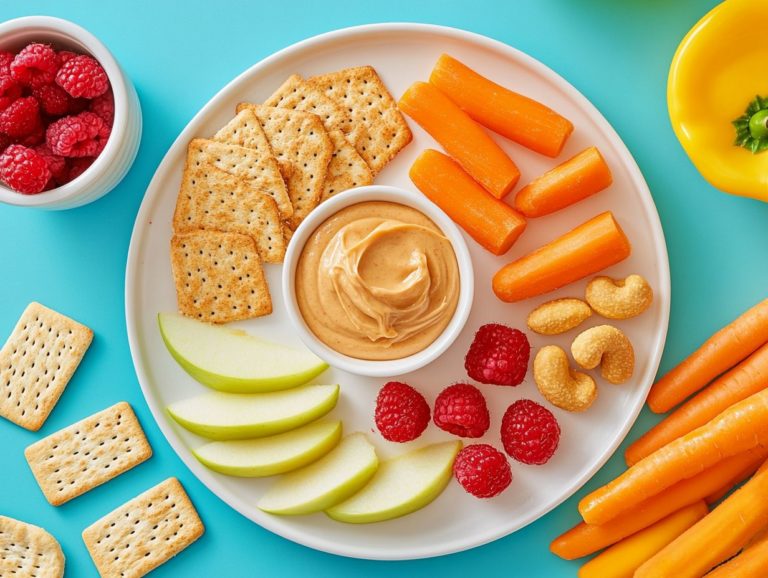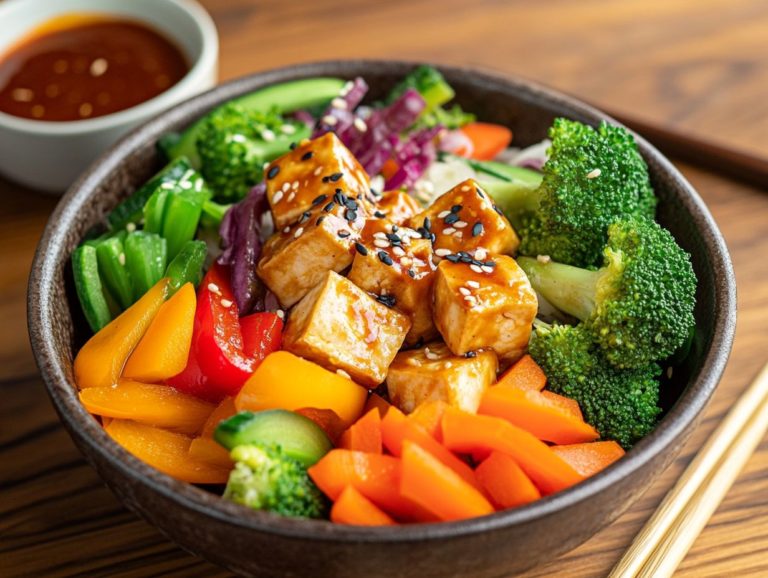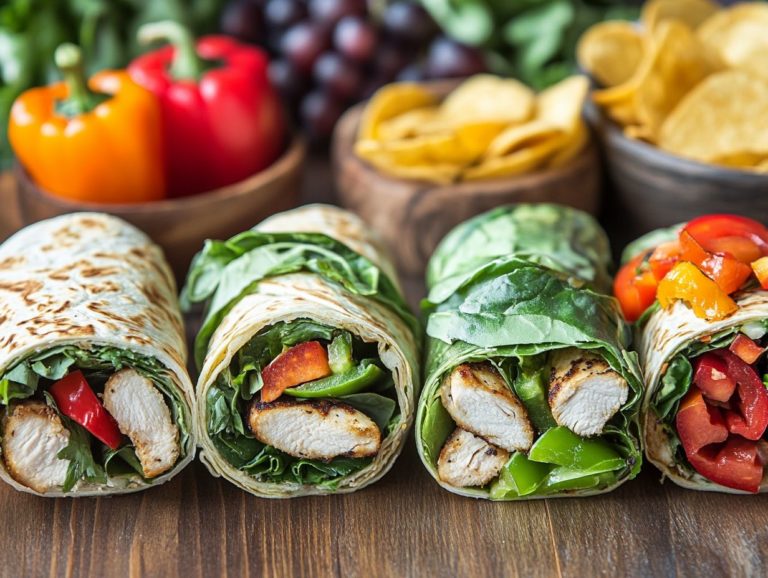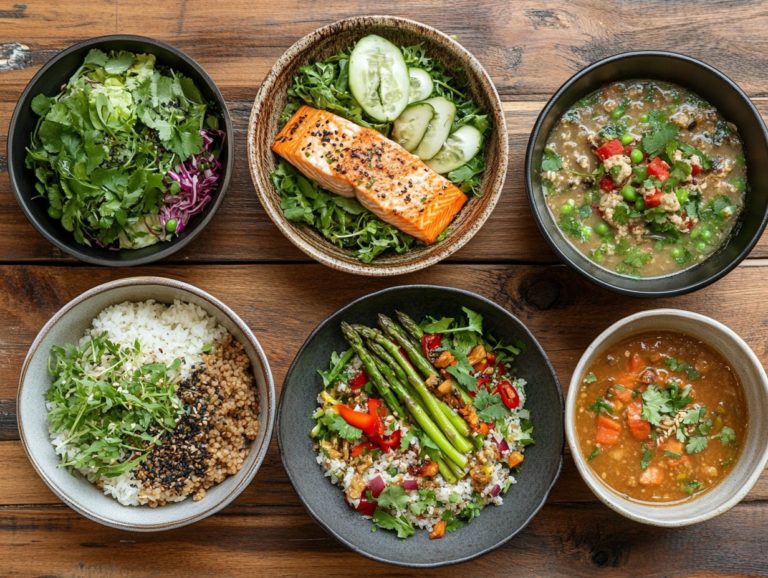5 High-Protein Recipes for Muscle Building
Ready to boost your muscle-building game with delectable, high-protein meals? You re in the right spot.
Here are five enticing recipes, ranging from Grilled Chicken and Vegetable Skewers to Baked Salmon with Sweet Potato and Broccoli. Each one is brimming with protein and simple to whip up.
You ll delve into the significance of protein for muscle development, discover optimal consumption guidelines, and gather tips for seamlessly incorporating these recipes into your meal plan. Get ready to supercharge your fitness journey today!
Contents
- Key Takeaways:
- 1. Grilled Chicken and Vegetable Skewers
- 2. Tuna and Avocado Salad
- 3. Black Bean and Quinoa Bowl
- 4. Egg White and Spinach Omelette
- 5. Baked Salmon with Sweet Potato and Broccoli
- Why Is Protein Important for Muscle Building?
- What Are Some Other High-Protein Foods for Muscle Building?
- How Much Protein Should One Consume for Muscle Building?
- What Are the Best Times to Consume Protein for Muscle Building?
- What Are Some Common Mistakes to Avoid When Trying to Build Muscle?
- How Can One Incorporate These Recipes into Their Meal Plan for Muscle Building?
- Frequently Asked Questions
- What are some high-protein recipes that can help with muscle building?
- Can these high-protein recipes be customized for dietary restrictions?
- How many grams of protein do these recipes contain?
- Are these recipes suitable for meal prepping?
- Can these recipes be used for weight loss as well?
- Do these recipes require any special equipment?
- Try these delicious recipes today!
Key Takeaways:
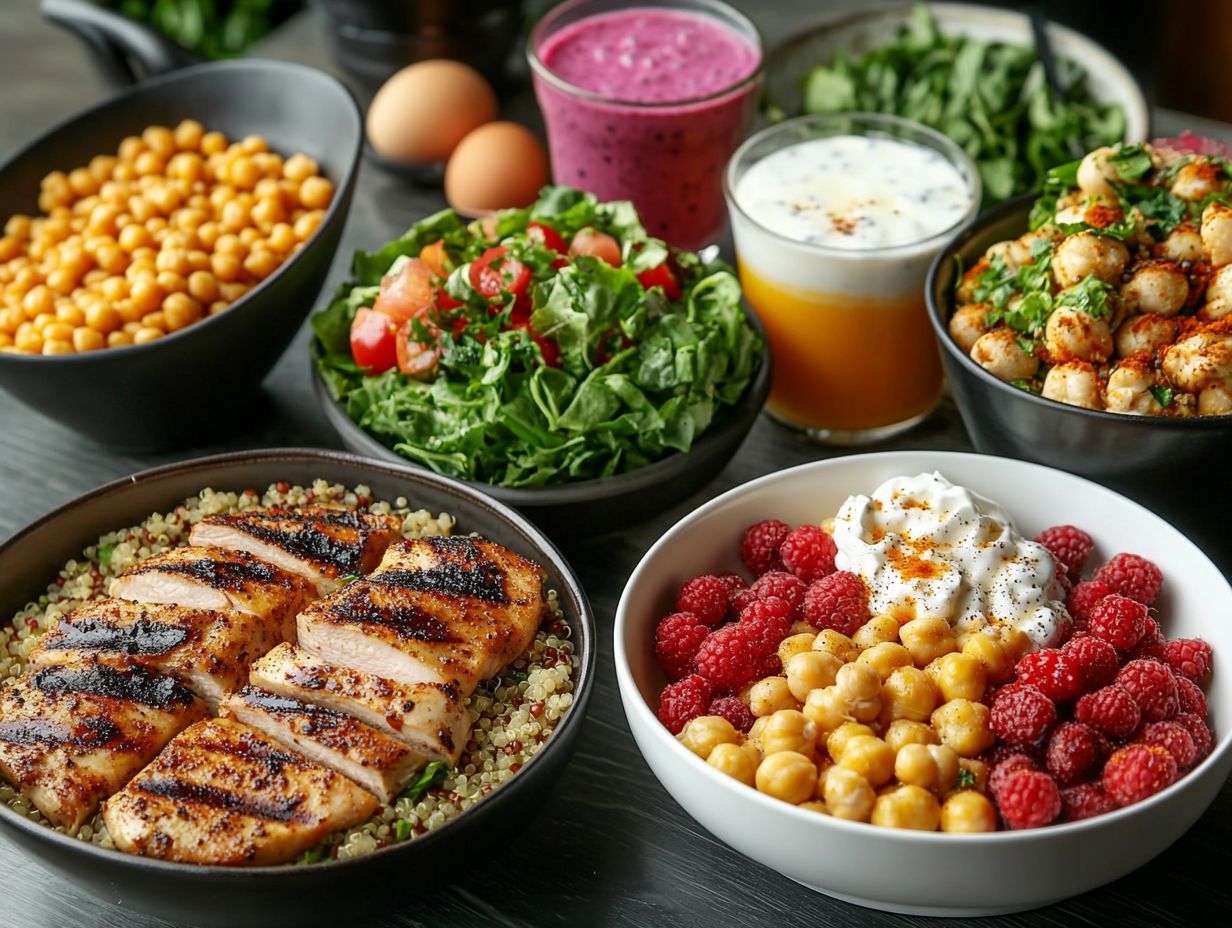
- Adding protein to your meals is crucial for muscle building, as it helps repair and build muscle tissue.
- Other high-protein foods include lean meats, dairy, and legumes.
- The recommended daily protein intake for muscle building is 0.8-1 gram per pound of body weight.
- Eating protein before and after a workout boosts muscle growth and repair.
- Avoid common mistakes like not consuming enough protein and not varying your protein sources, as these can hinder muscle-building progress.
1. Grilled Chicken and Vegetable Skewers
Grilled chicken and vegetable skewers are an exceptional choice for anyone seeking a protein-packed meal that promotes muscle growth while adhering to healthy eating practices. They make an ideal addition to your dinner table or meal prep routine.
These skewers deliver a substantial protein boost for recovery and muscle repair, complemented by the delightful nutritional perks of vibrant vegetables. Incorporating bell peppers, zucchini, and cherry tomatoes introduces a colorful array of vitamins, minerals, and antioxidants, making each bite both nutritious and delicious.
The fiber from these vegetables enhances satiety, aids digestion, and helps maintain a healthy weight. This dish fits seamlessly into a balanced lifestyle, providing essential nutrients while keeping your meals interesting and visually appealing.
2. Tuna and Avocado Salad
A tuna and avocado salad offers a delightful flavor combination while delivering a powerful nutritional boost. Its high-quality protein and essential omega-3 fats make it an ideal choice for health-conscious individuals.
This vibrant dish excites your taste buds and helps your muscles recover. It provides an excellent source of protein for repairing and building muscle tissues after an intense workout. The healthy fats in avocado promote heart health and help reduce inflammation, ensuring you feel energized and revitalized.
Incorporating this salad into your balanced diet supports overall well-being and enhances performance, making it a perfect addition to any fitness enthusiast’s meal plan.
3. Black Bean and Quinoa Bowl
A black bean and quinoa bowl presents a hearty, plant-based protein option that s rich in essential nutrients and fiber. It’s a complete meal ideally suited for your fitness journey, whether you re focused on weight loss or muscle building.
Combining black beans and quinoa elevates the dish’s flavor and provides the building blocks your body needs for muscle repair and recovery. This protein-packed creation is versatile, allowing you to customize it with various toppings consider fresh vegetables, creamy avocado, or a zesty dressing that sparks your taste buds.
Enjoy it warm or cold; it serves as an excellent lunch option that you can easily prepare in advance. For anyone committed to a healthy lifestyle, this bowl effortlessly integrates into meal planning, proving that nutritious eating can be both delicious and inventive.
4. Egg White and Spinach Omelette
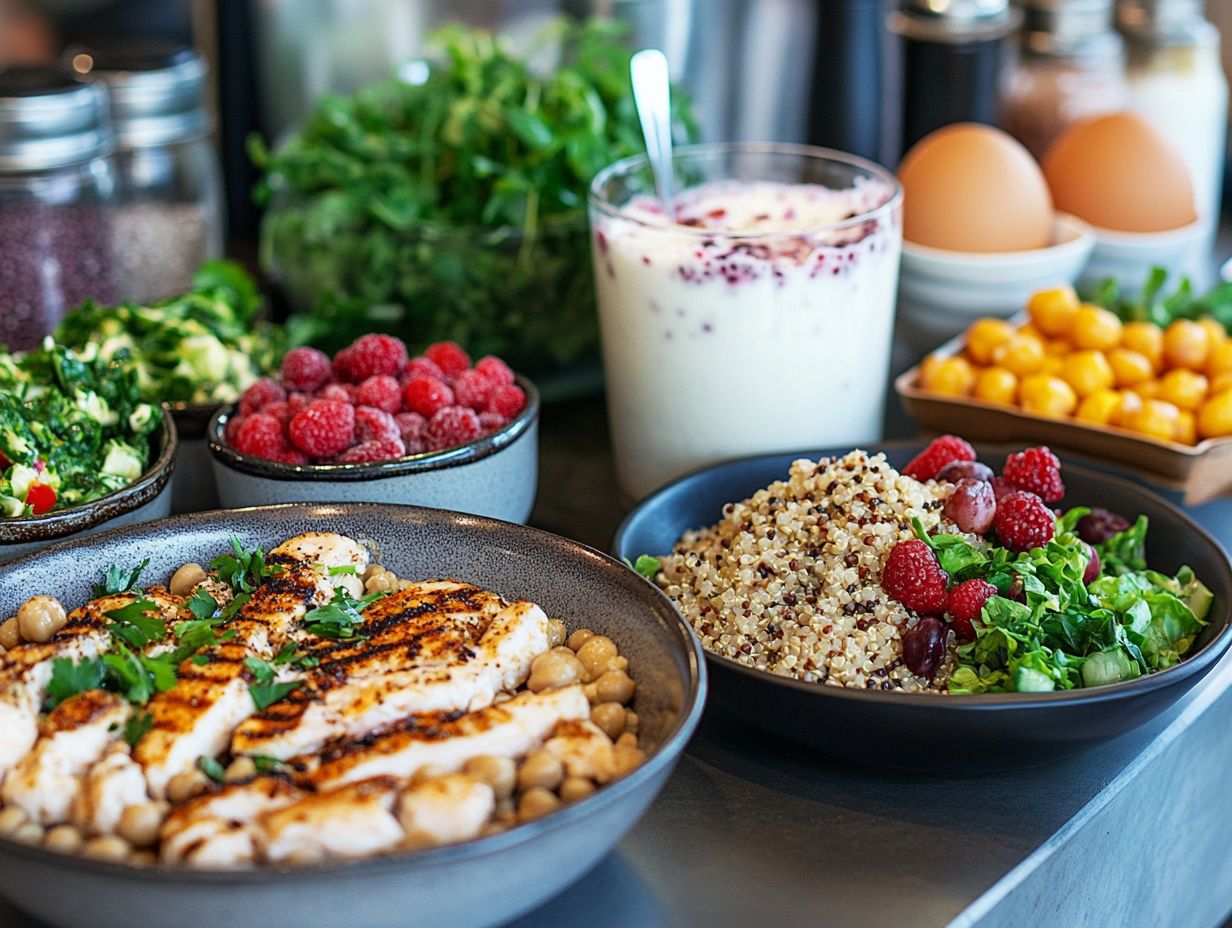
An egg white and spinach omelette is a quick and delightful meal that serves as a quick-digesting protein source and presents a low-fat option. This dish actively supports muscle protein synthesis and is a superb choice for a nutritious breakfast or a satisfying snack.
By incorporating spinach, you significantly enhance the omelette’s nutrient profile. Spinach adds essential vitamins such as A, C, and K, along with crucial minerals like iron and calcium. These nutrients are vital for muscle recovery and overall health.
Meal timing is important; enjoying this omelette shortly after a workout can amplify its benefits. Timing your meals aids in muscle repair and helps reduce soreness, making it a smart post-exercise option.
This combination of timely nourishment and nutrient density positions you to effectively reach your fitness goals. Don t miss out on this incredible meal!
5. Baked Salmon with Sweet Potato and Broccoli
Baked salmon with sweet potato and broccoli is a wonderfully balanced meal. It tantalizes the taste buds while delivering essential nutrients and healthy fats crucial for muscle growth and overall wellness.
The omega-3 fatty acids in salmon are particularly beneficial, known for reducing inflammation and enhancing heart health. This dish is ideal for anyone who engages in regular physical activity.
Sweet potatoes provide complex carbohydrates for a steady release of energy, essential for sustained workouts and effective muscle recovery.
With vibrant broccoli, rich in antioxidants and vital vitamins, this meal transforms into a nutritional powerhouse. It supports athletes and health enthusiasts alike on their journey toward enhanced performance and recovery. Get ready to boost your muscle recovery with this delightful dish!
Why Is Protein Important for Muscle Building?
Protein is absolutely essential for building muscle. It acts as the cornerstone for repair and growth. Ensuring your body receives the necessary amino acids to support muscle protein synthesis during and after workouts is vital.
You can find this crucial nutrient in various foods, such as lean meats, dairy products, legumes, and specific grains and vegetables. Each type of protein has unique benefits; for instance, whey protein is fantastic for quick absorption right after exercise, while casein offers a slow, steady release of amino acids.
To elevate your fitness journey, understanding these distinctions is key. Adequate protein intake aids in muscle recovery and enhances your overall performance. This means you can push yourself harder during training sessions and recover more swiftly, ultimately leading to greater strength gains and improved endurance.
What Are Some Other High-Protein Foods for Muscle Building?
Along with classic chicken and fish options, a variety of high-protein foods can significantly contribute to muscle building while supporting a balanced diet. Foods like lentils, Greek yogurt, and lean beef are excellent choices.
Incorporating quinoa and edamame into your salads or stir-fries adds a protein boost and essential nutrients that enhance your meals. Don t overlook eggs; whether scrambled or hard-boiled, they make for a quick snack that truly packs a punch.
Nuts and seeds are perfect for topping yogurts or oatmeal, providing delightful texture and flavor.
By weaving these foods into your daily meals or snacks, you can effortlessly meet your protein goals while enjoying a diverse array of flavors and textures. Try adding some of these to your next meal!
How Much Protein Should One Consume for Muscle Building?
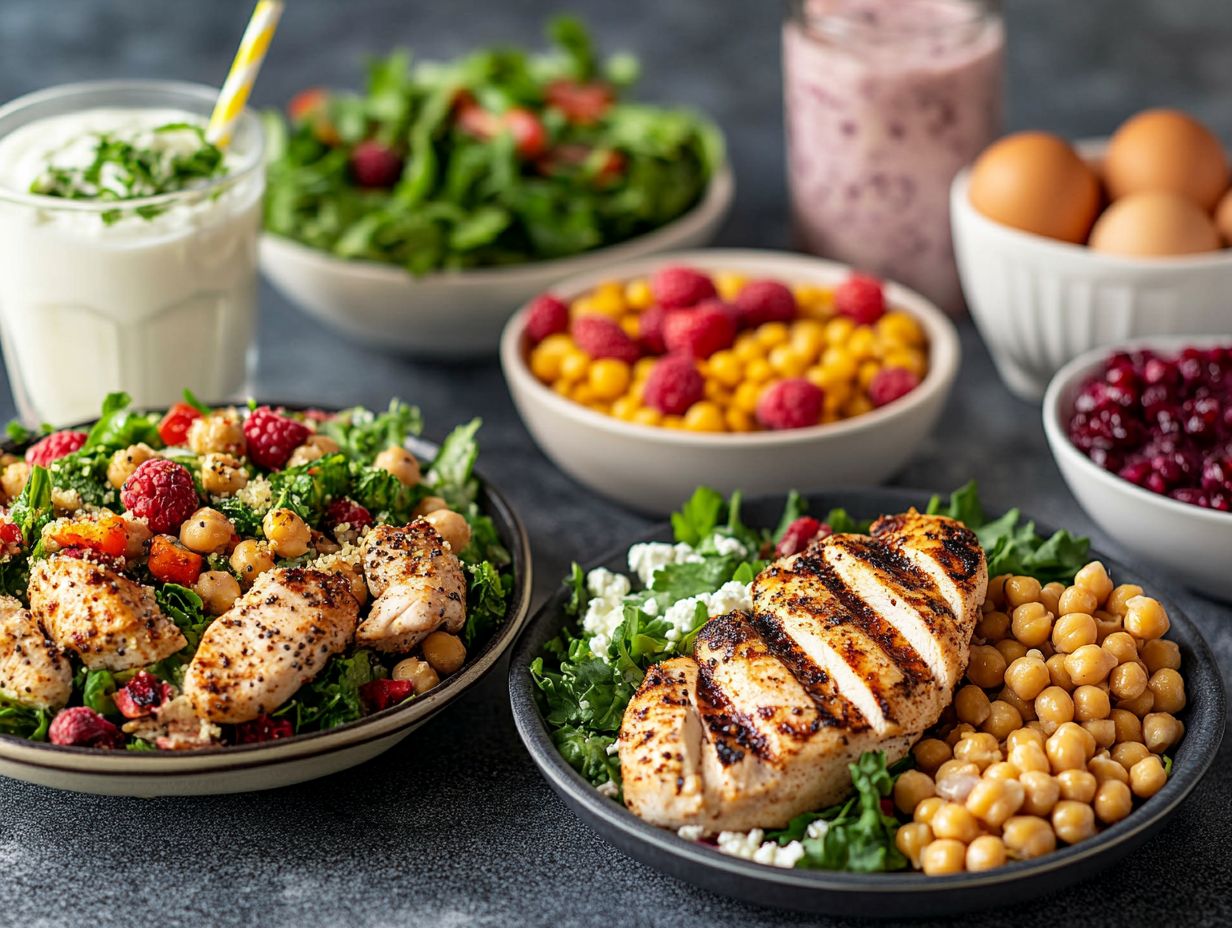
Determining the right amount of protein for your muscle-building journey is crucial. Your individual needs can vary based on body weight, activity level, and fitness goals.
To establish an effective protein intake plan, calculate your protein requirements in grams per kilogram of body weight. For those engaged in strength training, aim for 1.6 to 2.2 grams per kilogram to effectively stimulate muscle protein synthesis.
Focus on the quality of the protein you consume. Choose sources like:
- Lean meats
- Fish
- Dairy
- Legumes
- Nuts
These options not only provide the necessary amino acids but also contribute to your overall nutritional balance. By prioritizing high-quality proteins, you can optimize recovery and support muscle growth more effectively.
What Are the Best Times to Consume Protein for Muscle Building?
Understanding when to eat your nutrients, especially protein, is key for muscle recovery and growth. For athletes and fitness enthusiasts, post-workout protein intake is essential.
Timing your protein intake properly can maximize your gains. This ensures your body receives the vital building blocks for muscle repair and growth when it needs them most. Research shows that having protein shakes shortly after exercising can significantly enhance your recovery, allowing you to replenish vital nutrients swiftly. This practice not only aids in muscle repair but also helps reduce soreness, enabling you to perform better in future workouts.
By strategically adding protein shakes to your routine, you might find it easier to push through plateaus and achieve your fitness goals with greater efficiency.
What Are Some Common Mistakes to Avoid When Trying to Build Muscle?
When embarking on a muscle-building journey, it s easy to fall into traps like neglecting protein intake, failing to plan meals, and overlooking nutrient-rich recipes.
These oversights can seriously impede your progress and keep you from achieving those coveted muscle gains. Remember, protein is not just about building muscle; it s key for recovery too! Aim to calculate your daily protein needs based on your body weight and activity level. Include sources like:
- Lean meats
- Legumes
- Dairy
Start planning your meals now to avoid missing out on essential nutrients. Incorporating a variety of colorful ingredients enhances flavor and elevates nutritional content, leading to a well-rounded diet that supports muscle growth.
How Can One Incorporate These Recipes into Their Meal Plan for Muscle Building?
Incorporating protein-rich recipes like grilled chicken skewers, tuna salads, and quinoa bowls can significantly boost your muscle-building efforts. These meals ensure you consume balanced, complete meals that satisfy your nutritional needs.
By planning and prepping these dishes ahead of time, you can save precious moments during busy weekdays while enjoying nutritious meals that align with your health goals. For instance, marinate and cook grilled chicken skewers in bulk, storing them in the refrigerator to easily enhance salads or wraps throughout the week.
Tuna salads, packed with omega-3 fatty acids, come together quickly and are highly adaptable. Adding different fruits, vegetables, or whole grains keeps your meals fresh and exciting.
Quinoa bowls offer endless customization with various toppings and dressings, making them the perfect base for a variety of flavors and dietary preferences. This approach promotes a sustainable and enjoyable healthy lifestyle that you can truly savor.
Frequently Asked Questions
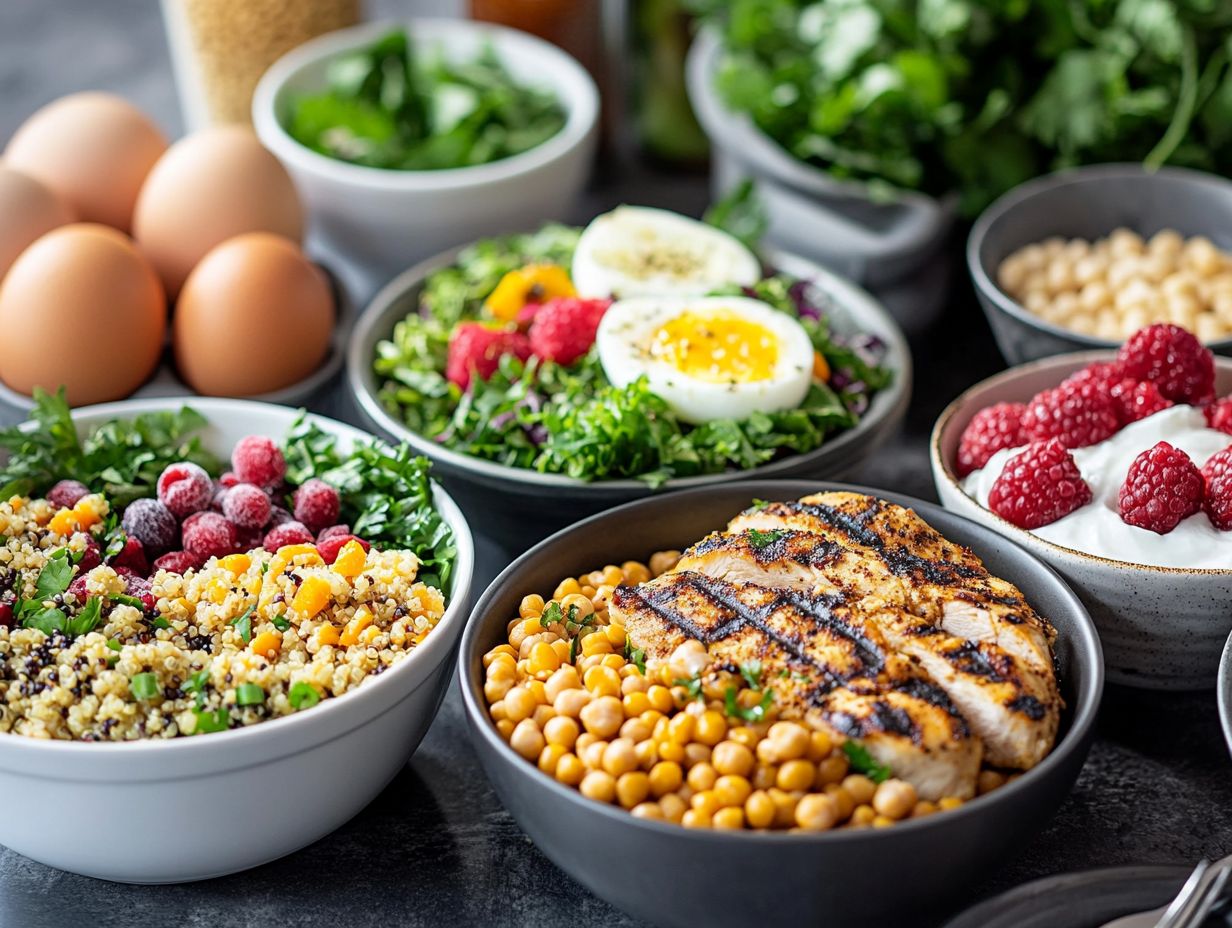
What are some high-protein recipes that can help with muscle building?
- Grilled Chicken and Vegetables: This simple recipe is high in protein and perfect for muscle building. Marinate chicken breasts in a mixture of olive oil, lemon juice, garlic, and herbs. Grill alongside your favorite veggies for a balanced and nutritious meal.
- Protein-Packed Omelette: Eggs are a great source of protein. This omelette takes it to the next level by adding chopped chicken, spinach, and cheese for extra flavor and muscle-building power.
- Quinoa and Black Bean Bowl: Quinoa is a complete protein, meaning it contains all nine essential building blocks of protein. Combine it with black beans, veggies, and a flavorful sauce for a well-rounded, high-protein meal.
- Baked Salmon with Sweet Potato and Broccoli: Salmon is rich in protein and omega-3 fatty acids, making it an excellent choice for muscle building. Pair it with sweet potatoes and broccoli for a balanced, nutrient-dense meal.
- Tofu Stir-Fry: Tofu is a fantastic plant-based source of protein. Combine it with stir-fry veggies and a delicious sauce for a tasty, high-protein meal that supports muscle building.
Can these high-protein recipes be customized for dietary restrictions?
Yes! All of these recipes can be tailored to meet various dietary restrictions. For instance, the Grilled Chicken and Vegetables can be made with tofu or tempeh for a vegetarian option. The Baked Salmon can be replaced with a plant-based protein such as tempeh or lentils for pescatarians or vegetarians. Additionally, the Quinoa and Black Bean Bowl can be made gluten-free by using tamari instead of soy sauce.
How many grams of protein do these recipes contain?
The exact protein content will vary depending on the specific ingredients and portion sizes. However, each recipe contains at least 25 grams of protein per serving, with some offering up to 40 grams.
Are these recipes suitable for meal prepping?
Absolutely! These recipes are perfect for meal prepping. They can easily be multiplied for multiple servings and stored in the fridge for a few days. Just follow proper food safety guidelines when storing and reheating.
Can these recipes be used for weight loss as well?
These recipes can also support weight loss while promoting muscle building. The key is to adjust portion sizes and incorporate them into a balanced diet along with regular exercise.
Do these recipes require any special equipment?
No special equipment is needed! Most recipes can be made with basic kitchen tools like a grill, stovetop, oven, and common utensils such as a knife, cutting board, and mixing bowls. Having a food scale or measuring cups can help with portioning and tracking macros.
Try these delicious recipes today!
Which recipe will you try first? Share your tasty results with us!

